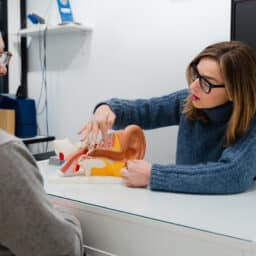What Are the Best Hearing Aid Features for an Active Lifestyle?

With spring and summer right around the corner, you might be antsy to get back to your favorite sports and outdoor activities. Whether biking, running or hiking around the Barton Creek Greenbelt, warm weather brings you the opportunity to get back to the outdoor things you love. If you’re a prospective hearing aid user, it’s…
Love Your Ears This Valentine’s Day: Self-Care Tips for Better Hearing

Valentine’s Day is almost here, and while it’s a great time to express love for those close to you, why not take a moment to show yourself some love, too? One area that often gets overlooked is your hearing health. Whether you’re enjoying your favorite music or talking to your loved ones, your hearing connects…
Make Hearing Aids Your 2025 Resolution

Approximately 15% of U.S. adults have difficulty hearing. Hearing loss is easy to overlook, but it significantly impacts your daily life. The new year is an opportunity to improve your health, relationships and overall well-being. If you’ve been hesitant about hearing aids, there’s no better time to take that first step. Let’s look at a…
How Can Untreated Hearing Loss Affect You?

Approximately one in 10 people in the United States live with some degree of hearing loss. For some, this might mean occasionally struggling to hear in noisy environments. For others, it can significantly hinder their ability to communicate with those around them, regardless of the setting. No matter the severity, addressing hearing loss is essential…
It’s Time To Celebrate National Speech-Language-Hearing Month

Each May, we join the American Speech-Language-Hearing Association (ASHA) in celebrating National Speech-Language-Hearing Month, a time dedicated to raising awareness about communication disorders and the pivotal role ASHA members play in providing life-changing treatments. Maintaining the health of your hearing and seeking treatment for speech disorders are vital components of overall well-being and effective communication….
Should You Wear Your Hearing Aids All the Time?

If you are new to hearing aids, you may be wondering if you should wear them all the time. The short answer? Yes! It is important to wear your hearing aids during your waking hours. Even if you are reading a book or engaging in another quiet activity where you think you don’t need them….
Can Action Movies Cause Hearing Loss?

Action films are known for their excitement and the soundscapes that define the theater experience. However, the auditory implications of such intense sound levels are often overlooked by avid moviegoers. Long-term exposure to elevated noise levels has been scientifically linked to hearing impairment. Noise above the threshold of 70 decibels (dB) can cause hearing loss…
How to Destress Before a Hearing Test

Approximately 28.8 million U.S. adults could benefit from the use of hearing aids. Hearing tests are an essential first step in the treatment process. However, for many people, the mere thought of sitting in an exam room can send shivers down the spine. While test anxiety is normal, it shouldn’t stop you from getting the…
Are Hearing Aids the Best New Year’s Resolution for You?

As the new year approaches, we often reflect on our lives and set resolutions to improve our health, relationships, work life and overall well-being. Addressing hearing loss is one resolution that often goes overlooked but can have a profound impact. Let’s look at why investing in hearing aids may be the best decision you make…
What Is The Link Between Smoking And Hearing Loss

Smoking has been long-known to negatively impact hearing health. Recent studies have shown a dose-response relationship between smoking and hearing loss, implying that the more you smoke, the greater your risk. However, these studies also show that this risk is removed once you quit smoking—even if only for a short period. Impact of Smoking on…